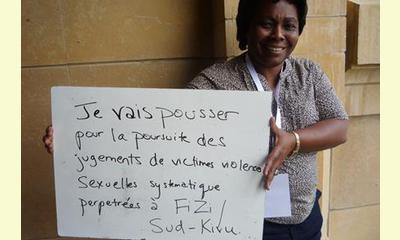|
|
16 Days of Activism: Julienne Lusenge, Democratic Republic of Congo
un articulo por Nobel Women's Initiative
Video: Julienne Lusenge
Each year since 1991, tens of thousands of
activists from around the world have taken part in
the 16 Days of Activism Against Gender Violence
Campaign. The campaign’s central messages –
women’s rights are human rights and violence
against women constitutes a violation of human
rights – have been a rallying call of the women’s
movement. For these 16 days, Nobel Women’s
Initiative is spotlighting stories about women
activists around the globe.

Julienne Lusenge
click on photo to enlarge
Julienne Lusenge is the President of Female
Solidarity for Integrated Peace and Development
(SOFEPADI), a coalition of 40 women’s organizations
in the Eastern provinces of the Democratic Republic
of Congo (DRC).
SOFEPADI works to defend and protect women’s rights
and provide support to survivors of sexual violence
by advocating for justice. Julienne works
tirelessly to manage the coalition as it fights for
an end to sexual violence in the DRC.
Julienne became an activist in 1998 when inter-
ethnic war arrived at her doorstep. After
witnessing members of armed groups raping and
brutalizing women in her community, Julienne was
compelled to act. She began documenting the cases
of abuse and condemning the acts in public. She
challenged the leaders of the armed groups in
writing, demanding that they cease using violence
against women in their war. “When armed groups
confront one another, it is the women who pay,”
she cried, “Women’s bodies are used as
battlefields—and this must end.”
The situation is grave for women living in a
region plagued by an ongoing 16-year conflict.
Tensions between warring ethnic groups remain,
resulting in women being the targets of systemic
sexual violence as well as being subjected to more
violence in the home. It is estimated that 48
women are raped every hour in the DRC. To make
matters worse, communities throughout the country
often disown and shun survivors of rape and sexual
violence.
Julienne and SOFEPADI actively promote acceptance
of survivors and reintegration into their
communities. She is beginning to see change.
Community support groups are mobilizing around
survivors – accepting women they would have turned
away in the recent past – and providing them with
much needed psychological and emotional support.
Julienne has acted as coordinator of the National
Campaign of Congolese Women Against Sexual
Violence and is Director of the Congolese Women’s
Fund. But Julienne’s work extends beyond the
borders of the DRC, as she sits on the Advisory
Committee of the International Campaign to Stop
Rape & Gender Violence in Conflict. Julienne has
been internationally recognized for her work,
receiving the Human Rights Award from the Embassy
of France in 2012. The French government selected
her as a Knight of the Legion of Honour in 2013.
[Note: Thank you to Janet Hudgins, the CPNN reporter
for this articl.e]
|








|
DISCUSSION
Pregunta(s) relacionada(s) al artículo :
Where in the world can we find good leadership today?,
* * * * *
Comentario más reciente:
:
Once again, as they have done now each year since 2009, the Nobel Women's Initiative provides biographies of 16 women leaders involved in local action for peace and justice around the world, and in particular to stop violence against women. Last year's biographies were listed in the CPNN discussionboard.

|
|









